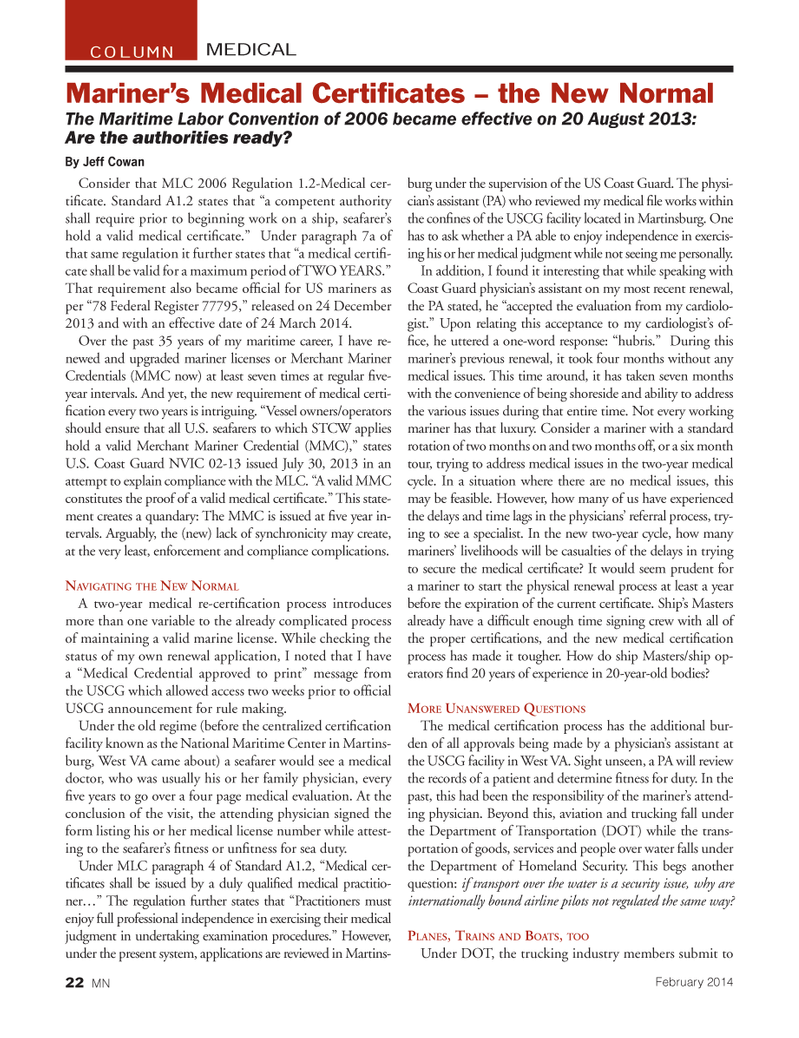
Page 22: of Marine News Magazine (February 2014)
Combat & Patrol Craft Annual
Read this page in Pdf, Flash or Html5 edition of February 2014 Marine News Magazine
Consider that MLC 2006 Regulation 1.2-Medical cer- tiÞ cate. Standard A1.2 states that Òa competent authority shall require prior to beginning work on a ship, seafarerÕs hold a valid medical certiÞ cate.Ó Under paragraph 7a of that same regulation it further states that Òa medical certiÞ -cate shall be valid for a maximum period of TWO YEARS.Ó That requirement also became ofÞ cial for US mariners as per Ò78 Federal Register 77795,Ó released on 24 December 2013 and with an effective date of 24 March 2014. Over the past 35 years of my maritime career, I have re- newed and upgraded mariner licenses or Merchant Mariner Credentials (MMC now) at least seven times at regular Þ ve- year intervals. And yet, the new requirement of medical certi- Þ cation every two years is intriguing. ÒVessel owners/operators should ensure that all U.S. seafarers to which STCW applies hold a valid Merchant Mariner Credential (MMC),Ó states U.S. Coast Guard NVIC 02-13 issued July 30, 2013 in an attempt to explain compliance with the MLC. ÒA valid MMC constitutes the proof of a valid medical certiÞ cate.Ó This state- ment creates a quandary: The MMC is issued at Þ ve year in- tervals. Arguably, the (new) lack of synchronicity may create, at the very least, enforcement and compliance complications. NAVIGATING THE NEW NORMALA two-year medical re-certiÞ cation process introduces more than one variable to the already complicated process of maintaining a valid marine license. While checking the status of my own renewal application, I noted that I have a ÒMedical Credential approved to printÓ message from the USCG which allowed access two weeks prior to ofÞ cial USCG announcement for rule making. Under the old regime (before the centralized certiÞ cation facility known as the National Maritime Center in Martins- burg, West VA came about) a seafarer would see a medical doctor, who was usually his or her family physician, every Þ ve years to go over a four page medical evaluation. At the conclusion of the visit, the attending physician signed the form listing his or her medical license number while attest-ing to the seafarerÕs Þ tness or unÞ tness for sea duty. Under MLC paragraph 4 of Standard A1.2, ÒMedical cer- tiÞ cates shall be issued by a duly qualiÞ ed medical practitio- nerÉÓ The regulation further states that ÒPractitioners must enjoy full professional independence in exercising their medical judgment in undertaking examination procedures.Ó However, under the present system, applications are reviewed in Martins- burg under the supervision of the US Coast Guard. The physi- cianÕs assistant (PA) who reviewed my medical Þ le works within the conÞ nes of the USCG facility located in Martinsburg. One has to ask whether a PA able to enjoy independence in exercis- ing his or her medical judgment while not seeing me personally. In addition, I found it interesting that while speaking with Coast Guard physicianÕs assistant on my most recent renewal, the PA stated, he Òaccepted the evaluation from my cardiolo- gist.Ó Upon relating this acceptance to my cardiologistÕs of- Þ ce, he uttered a one-word response: Òhubris.Ó During this marinerÕs previous renewal, it took four months without any medical issues. This time around, it has taken seven months with the convenience of being shoreside and ability to address the various issues during that entire time. Not every working mariner has that luxury. Consider a mariner with a standard rotation of two months on and two months off, or a six month tour, trying to address medical issues in the two-year medical cycle. In a situation where there are no medical issues, this may be feasible. However, how many of us have experienced the delays and time lags in the physiciansÕ referral process, try- ing to see a specialist. In the new two-year cycle, how many marinersÕ livelihoods will be casualties of the delays in trying to secure the medical certiÞ cate? It would seem prudent for a mariner to start the physical renewal process at least a year before the expiration of the current certiÞ cate. ShipÕs Masters already have a difÞ cult enough time signing crew with all of the proper certiÞ cations, and the new medical certiÞ cation process has made it tougher. How do ship Masters/ship op- erators Þ nd 20 years of experience in 20-year-old bodies? MORE UNANSWERED QUESTIONSThe medical certiÞ cation process has the additional bur- den of all approvals being made by a physicianÕs assistant at the USCG facility in West VA. Sight unseen, a PA will review the records of a patient and determine Þ tness for duty. In the past, this had been the responsibility of the marinerÕs attend- ing physician. Beyond this, aviation and trucking fall under the Department of Transportation (DOT) while the trans- portation of goods, services and people over water falls under the Department of Homeland Security. This begs another question: if transport over the water is a security issue, why are internationally bound airline pilots not regulated the same way? PLANES , TRAINS AND BOATS , TOO Under DOT, the trucking industry members submit to Mariner?s Medical Certi cates ? the New Normal The Maritime Labor Convention of 2006 became effective on 20 August 2013: Are the authorities ready?By Jeff Cowan MEDICALCOLUMN22 MNFebruary 2014 MN FEB14 Layout 18-31.indd 22MN FEB14 Layout 18-31.indd 221/20/2014 10:03:18 AM1/20/2014 10:03:18 AM

 21
21

 23
23
